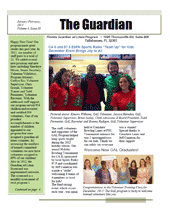The hub of information for the Second Judicial Circuit Guardian ad Litem Program, our blog contains posts with announcements, news and events, articles, periodicals and additions or updates to our website.
This page contains published posts from the February 2013 archive sorted chronologically with the newest at the top.
A new continuing education opportunity is now available for volunteer guardians ad litem.
On Friday, September 9, 2011, Florida's Center for the Advancement of Child Welfare Practice posted a video entitled "Engaging Families through Creative, Safe and Promising Family Time (Visitation) Practices" to their website. Charles Nelson recently said that he "came away with several new ideas [volunteers and staff] may want to consider" after watching the video.
Presented by Judge Lynn Tepper of the Sixth Judicial Circuit Court and Kelly Plouffe, Program Director for the Pasco Kids First sexual abuse treatment program, the video provides useful tips for volunteers and staff on "enhancing the visitation experience between families and children," understanding the removal process and the importance of family time.
All volunteers are encouraged to watch the forty-minute presentation. Those who watch the video may receive one (1) hour of continuing education credit. Remember, you can report your hours online quickly and easily.
Questions about continuing education may be sent to christine.gornik gal.fl.gov.
gal.fl.gov.
Volunteer Question
My case involves "Marie" who is 7 years old and "Roger" who is 5 years old. The parents divorced shortly after Roger was born. For some reason, the mother went north a couple of years ago and the children went to live with their father.
This case started when the children were removed from the father because of neglect. According to the shelter petition, they were often left at home alone for extended periods of time. The mother returned to Tallahassee when this happened and the children were placed with her. Mother and children live with the maternal grandmother, which is where I visit the children. The mother has obtained employment here and plans to stay and keep the children with her. Neither child is doing very well in school at this point.
The children often spend the weekend with their dad. They talk about him a lot and seem very bonded to him. I checked with the dependency case manager (DCM) who told me that dad quickly complied with almost everything in his case plan and has now been given unsupervised visitation. I've spoken to the dad on the phone one time. We have not had a court hearing since I have had the case; so I haven't seen him.
Since the mother plans to keep the children now, what further involvement do I need to have with the father?
Mentor Answer
There are several reasons that I would want to know a great deal more about the father and his relationship with Marie and Roger. A face to face interview with him could give you a good idea of what it was like for the children to live with their dad these last two years.
Was there a lack of mental stimulation and varied experiences that now causes them to lag in school? Were there no pre-school experiences? You can find out a lot by listening to him talk about the children—did he really get to know them? What was in the relationship which continues to make the children bonded to him?
Those two years have had a big impact on the children and what their current needs are. Since they spend many weekends with him, you certainly want to feel assured that they are safe when they are with him. Furthermore, does he plan activities with them that can improve their school performance? Does he read with them and so forth? Be sure to make some of your child visits when the children are with him for the weekend to observe firsthand the relationship.
Keep in mind that since he had custody the two years prior to shelter, he might decide to ask for the children to be returned to him when he fully complies with the case plan. At this point, you cannot be sure who the primary caregiver parent is going to be. Know as much as possible about both of the parents as you continue to advocate for best interest of Marie and Roger.
The latest issue of The Guardian newsletter is now available. You can download it below or, along with our past issues, on the Newsletters page.
In addition, our staff directory was updated with personnel changes, mobile telephone numbers and minor corrections.
The Play Therapy 101 continuing education session scheduled for Monday, February 11, 2013 has been suspended as of Tuesday, January 29, 2013 due to a scheduling conflict.
This event will be rescheduled for a future date, which will be announced here once determined.
We apologize for any inconvenience and thank the session's registrants for their patience.
![]() gal.fl.gov.
gal.fl.gov.







